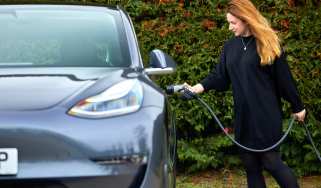How much tax will you pay on your new car?
Tax, including road tax and company-car tax, is an important part of any motoring budget

If you buy a new car, you’ll face a variety of different taxes during the purchase process, and that’s before you factor in your annual road tax – also known as VED (Vehicle Excise Duty). All of these can make a big difference to your overall running costs, so it’s worth investigating what these taxes are, so you know what you’ll have to pay.
Vehicle Excise Duty (VED, also known as road tax) is especially important, because if you don’t pay it, your car isn't legally allowed on public roads and you'll be liable for fines. You could even have your car confiscated if the police pull you over. If in doubt, you can quickly perform a vehicle tax check online. For the majority of private motorists, road tax is a relatively manageable cost and it's easy to make road tax online payments. You can even choose to stagger the payments for your annual amount, or pay it in one lump sum.
However, if you take the decision to accept a company car from your employer, you’ll face another form of tax that could amount to a much more significant sum. That’s because company cars are a perk that the government taxes heavily through a scheme called Benefit-in-Kind (BiK), though the amount you pay varies in relation to the car’s CO2 emissions, and whether you buy a diesel or not. In this article, we explore and explain the various forms of tax you need to consider when buying a new car.
New car VAT
The VAT on the purchase of a car is an often overlooked but substantial proportion of a new vehicle purchase. Since VAT is charged at 20%, more expensive models will increase the amount of tax you will pay. When you go car shopping, VAT is already included in the price of a new car, although if buying through a business you can view the price pre-VAT. The OTR (On the road) price of a vehicle is one including any taxes, including VAT that need to be paid on a new vehicle for it to be registered and driven on the public road.
First tax payment
Cars registered since 1 April 2017 have been liable for an initial tax payment that varies according to the car’s CO2 emissions. After the first year, VED becomes a flat rate. Like VAT, the first year’s tax is usually rolled into the advertised price for the car you'll see online and in the dealership.
The way VED payments are structured was changed in 2017 to incentivise the purchase of more efficient vehicles that are less polluting. Buy a car with zero emissions and there's no tax in the first year, while petrol cars in the 1-50g/km and 51-75g/km range are liable for £10 and £25 respectively, diesels in the same brackets are liable for £25, and £120 unless they meed RDE2 emissions standards. However, the most polluting cars emitting over 255g/km of CO2 are liable for a first tax payment of more than £2,365.
Vehicle Excise Duty (VED)
VED, also known as ‘road tax’, is an annual fee charged to vehicles that are UK registered and driven. It should be remembered that having a vehicle taxed and MoT’d is usually a requirement for insurers to offer valid cover while driving.
Before 1 April 2017, the amount of road tax owners would pay on their car would vary depending on the CO2 emissions emitted from the tailpipe. This system meant some petrol and diesel vehicles paid zero road tax.
Cars registered after this date include a first year tax determined by the vehicle's tailpipe emissions. Unlike before, the annual renewal amount for VED is simplified into three bands:
- Zero tailpipe emissions vehicles - £0 VED
- Petrol or Diesel vehicles - £180 VED
- Hybrid/LPG/Biofuel vehicles - £170 VED
Zero tailpipe emission cars are now the only ones eligible for zero road tax, while all petrol and diesel cars pay a £180 annual charge (this went up from £165 in April 2023). This fee is reduced to £170 (up from £155 in April 2023) if the vehicle is hybrid or running bioethanol or LPG. From 2025, even zero emissions vehicles will have to pay the standard rate of road tax.
If the car cost more than £40,000 when it was new, a VED surcharge of £390 (this went up from £355 in April 2023) is added to the first five annual tax payments, unless it has zero emissions.
If you own a car you want to keep in storage and not use on the public road, you can cancel car tax by making a SORN (Statutory Off-Road Notification) on the DVLA website, which lasts for 12 months. When you want to start using the car again, you can simply un-SORN it at any time.
Benefit-in-Kind (BiK)
Company cars are seen as one of the most desirable perks of employment, but BiK liability can also make them a significant expense for the one million UK motorists who use one.
The amount of BiK you'll pay is worked out by multiplying the car's value (listed as its P11D in car brochures and price lists) by a BiK band percentage determined by its CO2 emissions. Your income tax band (20%, 40% or 45% for England and Wales or 19%, 20%, 21%, 41% or 46% for residents of Scotland) is also factored in.
Which company car you choose can make a big difference to BiK payments. From April 2020, electric cars were placed into a 0% BiK band, so cost nothing at all. From 2022-25 this increased to 2% for zero emissions. In contrast, a luxury petrol car with high emissions could cost over £10,000 a year in BiK tax.
Fuel tax
If you have a company car with free fuel, which you also use out of your working hours, you're probably liable for the company-car fuel benefit.
Therefore, you'll still need to pay tax to HMRC, even when free fuel can seem like a great perk. It's worked out by multiplying the BiK band your company car sits in (e.g. 27%) by £27,800 (for the 2023/24 tax year). For a car in the 27% BiK band this means £6,950 in tax, so it may not be worth it if you spend less than this on fuel for private use.
More on UK car tax...
Recommended

Company car tax 2025: benefit-in-kind (BiK) rates explained

Classic car tax exemption: which historic vehicles qualify?
Most Popular
Tips & advice

Car dashboard warning lights: what does each symbol mean?

Electric car charging stations: public networks, charger types, apps and maps









